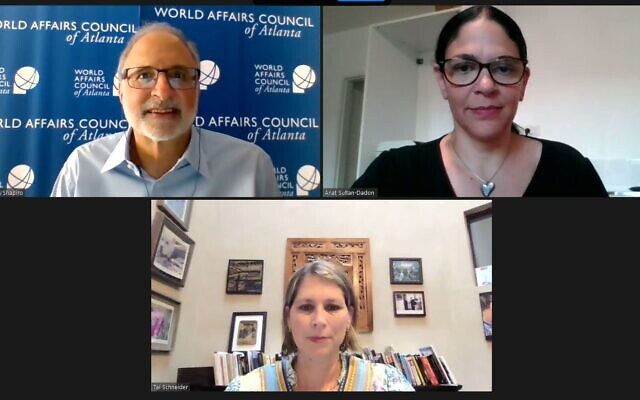Post-Netanyahu Government Still in Crisis
Atlanta program featured Israeli political correspondent.

Explaining Israeli politics is always a challenge. But Times of Israel political correspondent Tal Schneider faced the task head-on in a Zoom meeting July 5 entitled “Israel’s (New) Political Landscape,” organized by the World Affairs Council of Atlanta.
Schneider was introduced by Anat Sultan-Dadon, consul general of Israel to the Southeastern U.S., who was in Mitzpe Ramon in southern Israel. Schneider tackled the subjects of Israel’s unique coalition politics, the instability of the current, post-Benjamin Netanyahu government, Israel’s relationship with the United States and the sticky question of whether there’s a two-state solution in Israel’s future.
“We’re still in crisis,” Schneider told her mostly Atlanta audience. She was responding to a question posed by World Affairs Council President Charles Shapiro, a former U.S. ambassador to Venezuela. After four elections in two years, the 12-consecutive-year premiership of Netanyahu has finally ended, Schneider said, but the former prime minister has not disappeared. She called him the “most powerful leader of the opposition we’ve ever seen.”
She described how the opposition under Netanyahu is doing everything it can to bring down the new government, including voting against bills his party proposed in the Knesset, Israel’s parliament. In response to Shapiro’s repeated question, Schneider said she couldn’t predict whether the new government will survive its entire four-year term. Much depends on whether the coalition can pass a national budget this fall, she said. The country has plodded along, even during the pandemic, without a national budget for two years.

“The conventional wisdom is if it passes a budget, it’s safe” until the end of its term, Schneider said. If the budget doesn’t pass, the government automatically falls and Israelis return to the voting booths for a fifth time in less than three years.
The unusual eight-party coalition government composed of right-wing, center, left-wing and Arab parties was constructed based on its eagerness to replace a Netanyahu-led government. But Schneider said the new coalition partners agree on several other issues. She highlighted the importance the government places on improving Israel’s relationship with the United States. Unlike under Netanyahu, the new government led by Prime Minister Naftali Bennett believes the country should not publicly fight with the U.S.
The Bennett government has stated that it doesn’t support a new international nuclear agreement with Iran that is now under consideration by President Joe Biden’s administration. The United States under former President Donald Trump pulled out of the first multi-national agreement with Iran, which had been approved when Barack Obama was president. Schneider pointed out, though, that Bennett recently appointed a new and surprising head of the National Security Council. Saying how she broke the news recently of Eyal Hulata’s appointment, Schneider said that the career Mossad operative thought the first agreement “was legit and the lesser of two evils. This is the person who goes with Bennett to the White House.”
The new government has agreed not to make any decisions about solving the conflict with the Palestinians, Schneider said. She added that this took the questions of annexing part of the West Bank or a possible two-state solution off the government’s agenda.
Schneider was asked, however, whether she thought the two-state solution was a viable resolution of the issue. Admitting that her view wasn’t common among Israelis, she said that Israel has already been “living in a one-state solution for years. The sooner we face this fact of life, the sooner we recognize this fact, the sooner we will have a fresh approach” to the Israeli-Palestinian conflict. Noting how traumatic the evacuation of settlers from Gaza was in 2005, she said she doesn’t see any willingness in the country to evacuate settlers from the West Bank.
“It won’t change in my lifetime,” she concluded.
Watch the discussion on YouTube.
- Jan Jaben-Eilon
- TAL SCHNEIDER
- Times of Israel
- News
- Israel
- Anat Sultan-Dadon
- Mitzpe Ramon
- Benjamin Netanyahu
- World Affairs Council
- Knesset
- Prime Minister Naftali Bennett
- Charles Shapiro
- President Joe Biden
- President Donald Trump
- Barack Obama
- National Security Council
- White House
- Eyal Hulata
- West Bank
- Israeli-Palestinian conflict
- Gaza
- Local



comments